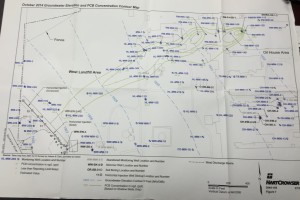Washington Department of Ecology – NEWS
March. 15, 2016
Contacts: Brook Beeler, communications, 509-329-3478, @ecyspokane
Spokane River task force advances fight on toxics
New report shows progress toward reducing PCBs in river
SPOKANE – A Spokane River group leading efforts to find and eliminate toxic chemicals has prevented 283 pounds of cancer-causing polychlorinated biphenyls (PCBs) from entering the river.
A 2007 study estimated that in order to meet water quality standards for the Spokane River, 1.68 pounds of PCBs would need to be prevented from entering the river each year.
Since the study, the Spokane River Regional Toxics Task Force has removed 265 pounds of PCBs from soil, wastewater and stormwater, and eliminated the potential for another 18 pounds from reaching the river.
PCBs remain in the environment and build up over time in fish, animals and people. That’s why finding even tiny amounts of these chemicals in the Spokane River requires action.
A new report from the Washington Department of Ecology shows that the task force has made measurable progress toward identifying, reducing and controlling PCBs and related toxic chemicals in the Spokane River.
“The task force’s ultimate goal is to help the Spokane River meet strict water quality standards that protect people and the environment,” said Water Quality section manager Jim Bellatty. “Without the group’s collective problem solving and ability to work together, we wouldn’t have made such significant progress in tackling PCBs for the health of our river and community.”
The group, facilitated by the William D. Ruckelshaus Center, has been working since 2012 on a comprehensive approach to simultaneously identify and reduce all sources of PCBs in the Spokane River Basin. Ecology’s role in the task force is to provide resources and ensure accountability of its members, including evaluation of the group’s activities.
Task force members have completed a variety of projects including preventing PCBs from potentially entering the river by removing sediment from stormwater catchments, replacing light ballasts and electrical transformers and improving wastewater treatment.
The report also highlights several studies completed by the task force or its members. Two studies pinpoint sources of PCBs in general consumer products and common municipal products. These studies and the task force’s leadership has resulted in state and local governments establishing purchasing policies that will provide preference for products that don’t contain PCBs.
More projects are currently underway to identify additional sources of PCBs to the river including a study of fish hatcheries, air deposition and groundwater. The task force also is developing a suite of best practices that can be used to reduce PCBs and bring the Spokane River into compliance with water quality standards.
PCBs are a group of chemicals once commonly used in caulks, paints and electrical transformers. Although PCBs were banned in 1979, they continue to leak out of old materials today and cause environmental harm. New PCBs are also created as byproducts in manufacturing and can be found in dyes and pigments.
###

